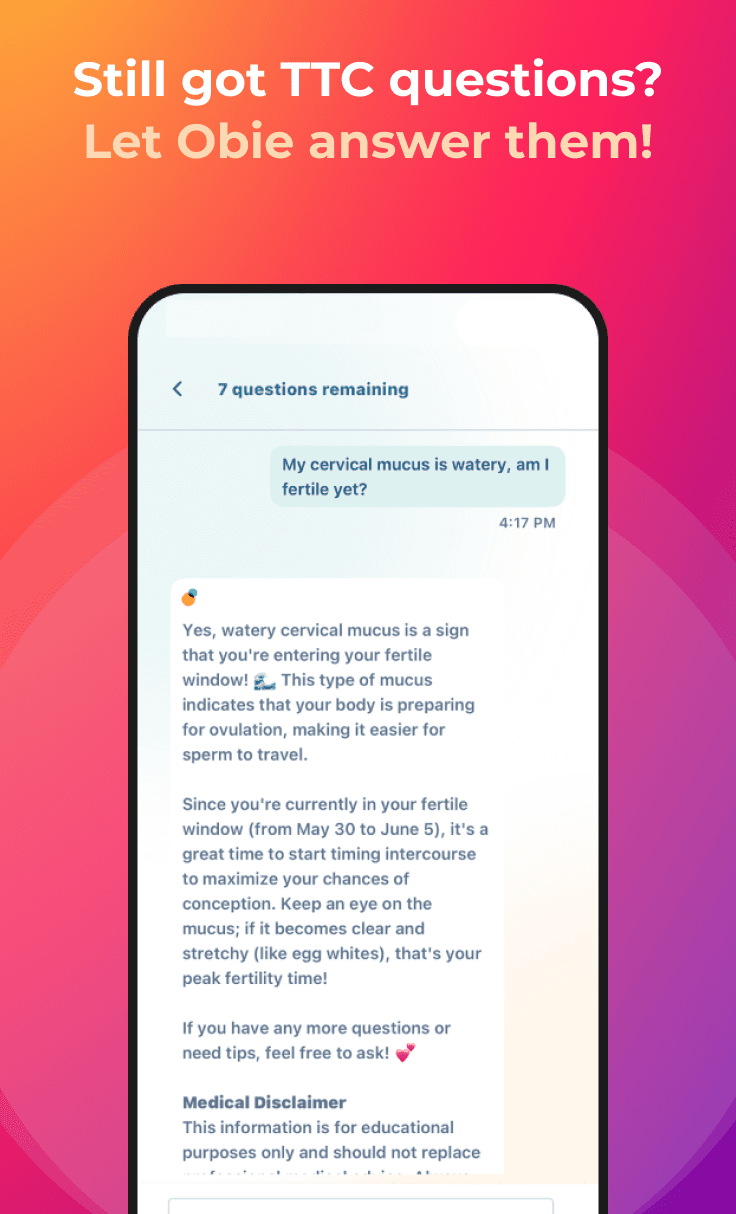Foreplay: Best For Lubrication When Trying To Get Pregnant
Getting Pregnant
Obie Editorial Team

Why is lubrication so important when trying to get pregnant?
Sufficient lubrication of the vagina is an essential part of enjoying sex and when getting pregnant. In its natural form, lubrication is achieved by the secretion of fluid from the vaginal walls and glands, usually with sufficient foreplay. Lubrication of the vagina can also be achieved by adding artificial lubricants, though there are some that should not be used because they are not "sperm-friendly".
Insufficient lubrication can be a problem
Many heterosexual couples who are actively trying to conceive are told to have sex during their fertile window, typically every day or every other day during their fertile window (the 5 days prior and the day of ovulation). Having sex on a schedule—and perhaps even any anxiety or stress around conception—may mean either partner isn’t as relaxed or aroused as they’d hope to be during intercourse.
One study examined the self-reported experiences of 900 TTC couples. Researchers found that 88% of couples stated that, while trying to conceive, vaginal dryness negatively affected intimacy sometimes, often, or always.
Foreplay improves natural vaginal moisture and likely your chances getting pregnant
When trying to conceive having a moist vagina does not just feel better, it might actually improve your chances of getting pregnant. Sperm survive better in a moist environment, and natural moisture which can be improved with sufficient foreplay usually works the best.
Up to 50% of couples report problems with proper lubrication. But when you are trying to get pregnant, there is also concern about the sperm count -- every single sperm counts, and you don't want to do anything that impairs the sperm count and/or function. Studies have shown that saliva is not a sperm-friendly medium, nor is water. And anything petroleum-based, such as Vaseline, should be avoided.
Clomid (Clomiphene citrate) and lubrication
Additional considerations come into play for couples using Clomid (clomiphene citrate), a fertility medication. Clomid works by blocking estrogen production, and estrogen is key to vaginal moisture—so women who are taking Clomid may experience vaginal dryness, even if that’s never been an issue for them before. Lubricant can be very helpful for patients using Clomid for timed intercourse, but you need to use a known sperm-friendly lubricant.
Vaginal dryness and medical issues
If you consistently have vaginal dryness, this could be a symptom of early menopause, certain medical conditions or infections, or a hormone imbalance. If vaginal dryness is a frequent problem for you, consult your doctor.
Artificial lubricants and trying to get pregnant
Artificial lubricants (such as KY Jelly, Astroglide, and Femglide) have been found in several studies to have a negative effect on sperm.
There are two lubricant (BabyDance and PreSeed) which have been found to have the least adverse effect on sperms. These are "sperm-friendly" intimate moisturizers that mimics natural body secretions to relieve vaginal dryness while providing an optimal sperm environment. Moisture is delivered in a fluid with the same pH and osmolarity as semen, so as not to harm sperm, and to be mild to a woman's body.
For couples having difficulties getting pregnant, or male partners who are already dealing with abnormal sperm counts, or other issues, experts recommend skipping the artificial lubrication (or using a truly fertility-friendly brand) to maximize pregnancy chances.
Here are some suggestions for doing without an artificial lubricant:
- Foreplay should be an essential part of your interaction every time you have sex. Allow for sufficient time for foreplay
- Start with a romantic evening.
- Massage each other.
- Talk sweetly to each other.
- Touch each other's body parts, except for the genitalia







